Bringing a new puppy into your home is an exciting time filled with joy, cuddles, and endless energy. Small breed puppies, with their petite stature and rapid growth rates, have unique nutritional requirements that demand special attention. Their fast metabolisms mean they need a calorie-dense diet, while their smaller mouths and delicate digestive systems require appropriately sized kibble and easily digestible ingredients. Choosing the right food is paramount to supporting their healthy development, strong bones, vibrant coats, and boundless energy during these crucial early months.
As dedicated pup parents, providing the best start for your tiny companion involves selecting high-quality food tailored to their specific needs. This guide highlights the best puppy foods for small breeds in 2021, focusing on formulations that offer balanced nutrition, support overall health, and cater to the unique characteristics of your little furry friend. From fresh, personalized meals to specialized kibble, we’ve reviewed top options to help you make an informed decision for your growing pup. For ensuring your tiny companion always has appropriate entertainment, consider exploring [the best dog toys for aggressive chewers](https://dogcarestory.com/the-best-dog-toys-for-aggressive-chewers/) as they transition from playful puppyhood to adulthood.
Top Picks for Small Breed Puppy Foods
The Farmer’s Dog: Fresh, Personalized Nutrition for Puppies
The Farmer’s Dog has revolutionized pet nutrition with its commitment to fresh, human-grade ingredients and personalized meal plans. Owners begin by completing a comprehensive quiz about their puppy’s specific health, weight, breed, and age, allowing The Farmer’s Dog to formulate a diet perfectly suited to their individual needs. This bespoke approach ensures that your small breed puppy receives the precise nutrients required for optimal growth and development, preventing common issues like overfeeding or underfeeding that can be prevalent in rapidly growing small breeds.
Their recipes, like the Turkey Fresh Dog Food, are prepared with a laser focus on quality and freshness. This makes it an excellent choice for small breed puppies who might be picky eaters or those with sensitivities and food allergies, as the customized plans can avoid common allergens like chicken or turkey if necessary. The convenience of pre-portioned meals delivered to your doorstep takes the guesswork out of feeding, providing peace of mind that your small breed puppy is receiving the healthiest, freshest possible start in life. The focus on high-quality protein and essential nutrients supports healthy muscle development and sustains their high energy levels throughout the day.
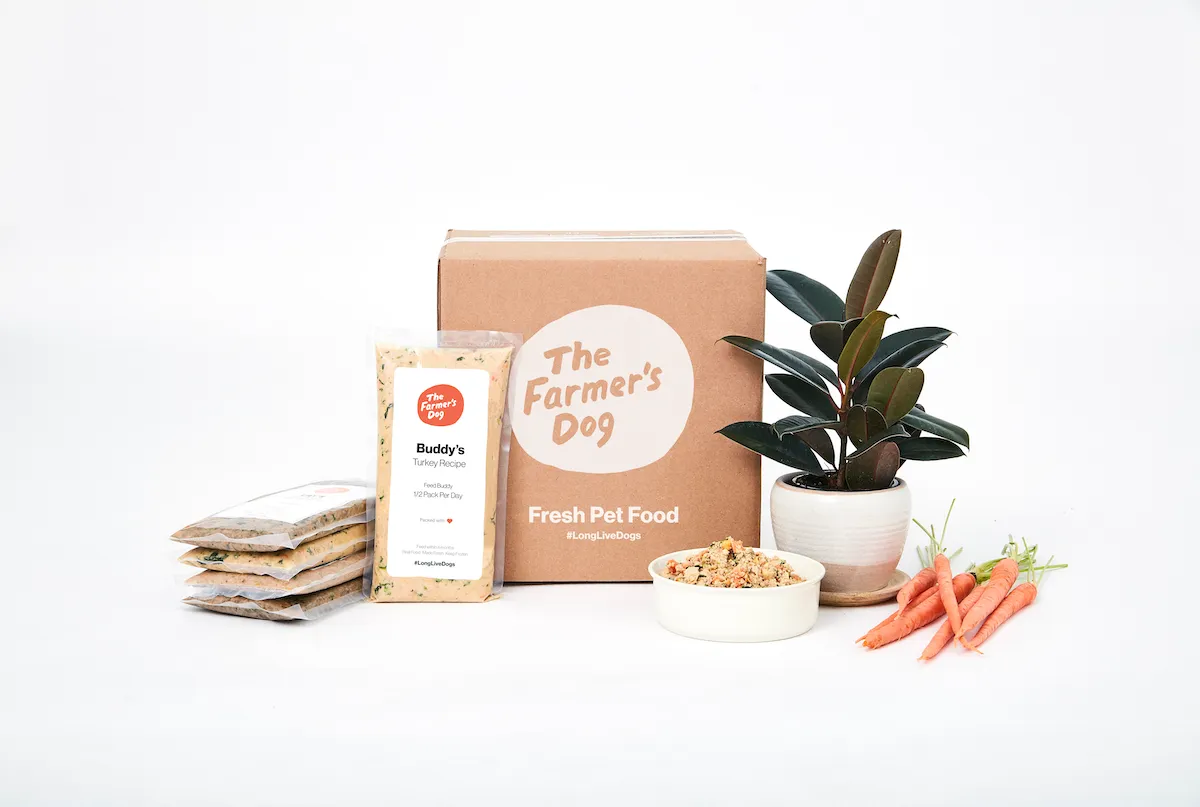 The Farmer's Dog fresh food delivery for a small breed puppy
The Farmer's Dog fresh food delivery for a small breed puppy
Nom Nom Beef Mash: Vet-Formulated Goodness for Growing Pups
Nom Nom offers another outstanding fresh food subscription service, providing personalized nutrition tailored to your puppy’s unique requirements. Developed by board-certified veterinary nutritionist Dr. Justin Shmalberg, the Nom Nom Beef Mash recipe is a prime example of high-quality puppy food. It’s crafted with fresh, restaurant-quality ingredients such as ground beef, russet potatoes, eggs, carrots, peas, and fish oil, all sustainably sourced from reliable U.S. growers and suppliers. This meticulous selection of ingredients ensures that your small breed puppy receives easily digestible and highly nutritious meals.
The customizable nature of Nom Nom makes it an ideal choice for small breed puppies, including those with particular dietary needs such as managing a healthy weight or navigating food allergies. The inclusion of fish oil is especially beneficial, contributing to a shiny, healthy coat and supporting crucial brain development, which is vital during a puppy’s formative months. With Nom Nom, you’re not just feeding your puppy; you’re providing a vet-approved, nutrient-dense diet designed to foster robust health and vibrant energy, ensuring they thrive from puppyhood into adulthood.
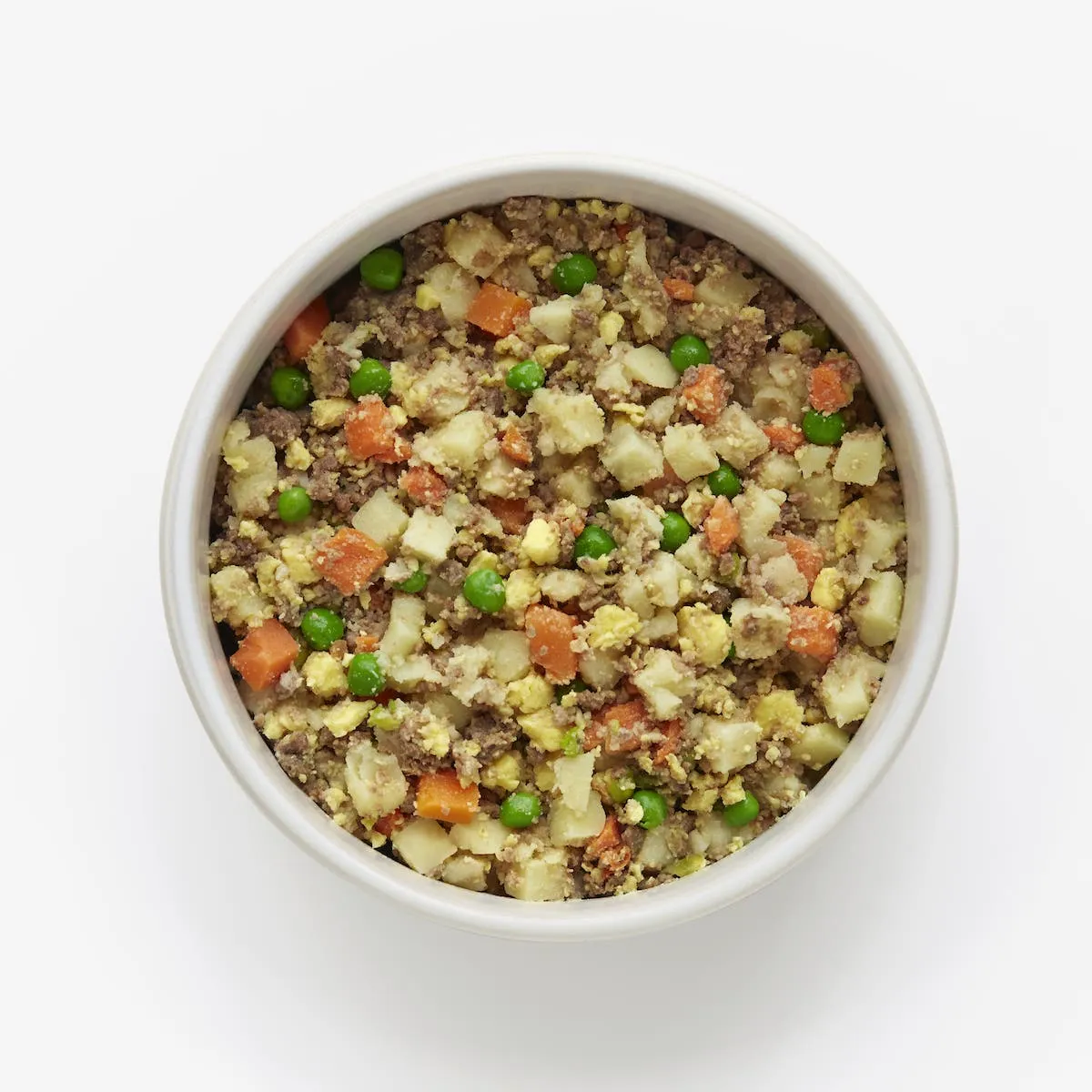 Nom Nom Beef Mash fresh dog food in a bowl, suitable for small breed puppies
Nom Nom Beef Mash fresh dog food in a bowl, suitable for small breed puppies
Blue Buffalo Life Protection Formula Small Breed Puppy: Optimal Growth Support
Blue Buffalo’s Life Protection Formula for Small Breed Puppies is a highly trusted option, specifically designed to meet the intensive developmental needs of growing small dogs. This formula features real deboned chicken as the very first ingredient, ensuring a rich source of high-quality protein necessary for building strong, lean muscles. Beyond protein, this kibble is fortified with crucial nutrients like DHA and ARA, fatty acids naturally found in mother’s milk, which are essential for supporting healthy cognitive development and retinal function in rapidly growing puppies.
The carefully balanced formula also includes calcium and phosphorus to promote strong bones and teeth, which are vital during puppyhood. Blue Buffalo’s exclusive LifeSource Bits, a precise blend of antioxidants, vitamins, and minerals, are also incorporated to support a robust immune system. Importantly, this small breed puppy food is made without common allergens and fillers such as chicken (or poultry) by-product meals, corn, wheat, or soy, providing peace of mind for conscientious puppy parents. This comprehensive nutritional profile helps ensure your tiny companion receives all the necessary building blocks for a healthy, energetic start to life.
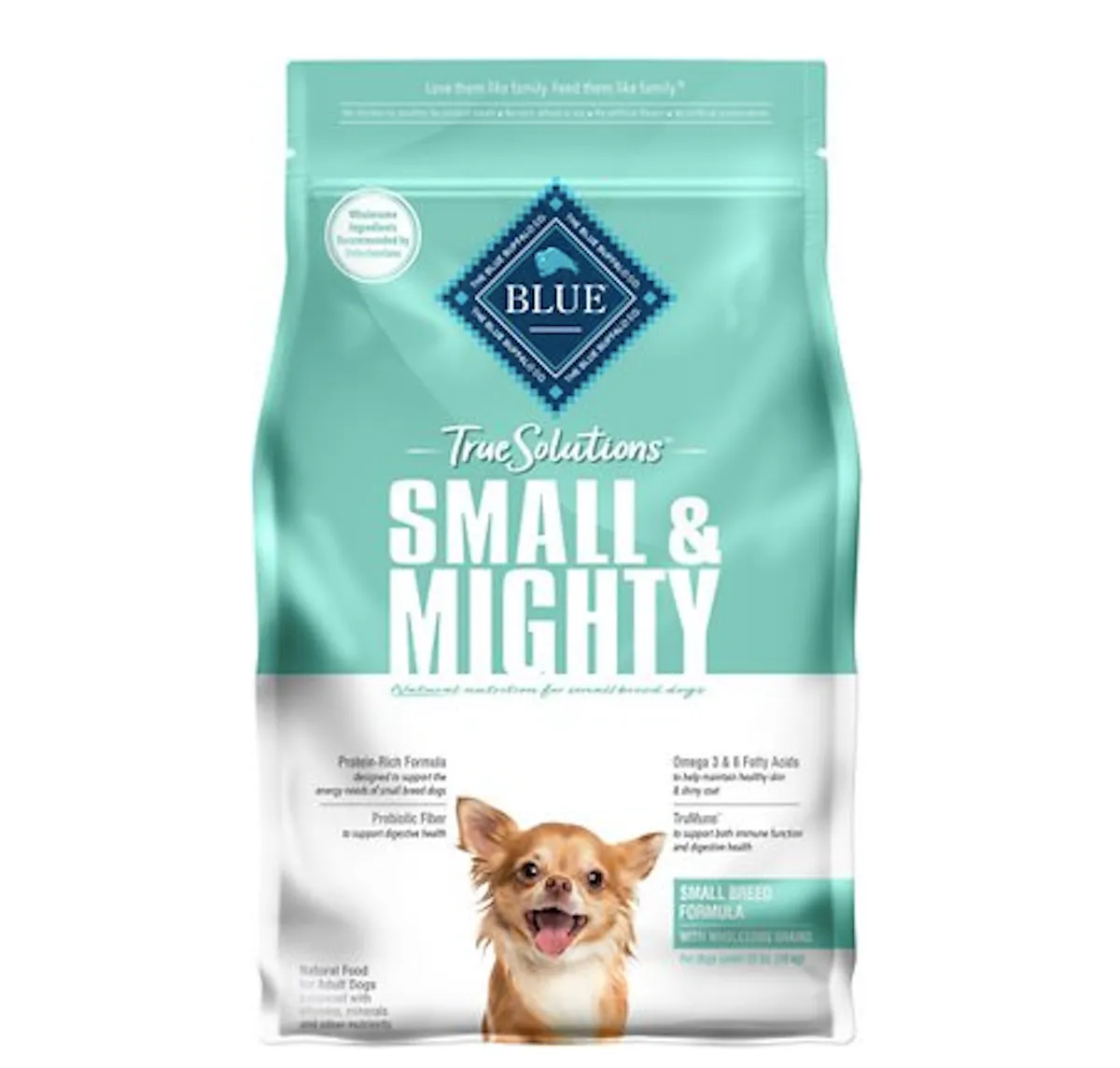 Blue Buffalo Life Protection Formula Small Breed Puppy dry kibble
Blue Buffalo Life Protection Formula Small Breed Puppy dry kibble
Merrick Lil’ Plates Grain-Free Small Breed Puppy: Tailored for Tiny Mouths
Merrick Lil’ Plates Grain-Free Small Breed Puppy dry dog food, featuring a Real Chicken and Sweet Potato Recipe, is specifically crafted to cater to the unique requirements of tiny pups. Deboned chicken is the leading ingredient, providing the high-quality protein necessary for muscle development in growing puppies. What truly sets this formula apart is its smaller-sized, crunchy kibble, which is perfectly suited for small breed puppies’ mouths, making it easier for them to chew and digest. This kibble also assists in cleaning teeth as they eat, contributing to better oral hygiene from a young age.
This recipe is also enriched with DHA to support healthy brain development and packed with antioxidants to bolster immune health, crucial for a puppy’s developing defenses. High levels of Omega-6 and Omega-3 fatty acids promote healthy skin and a shiny coat, while leading levels of glucosamine and chondroitin are included to support healthy hips and joints—a significant consideration for many small breeds prone to joint issues later in life. Furthermore, its grain-free formulation avoids common dietary sensitivities, making it an excellent choice for puppies with delicate digestive systems. If your puppy loves to chew, ensuring they have appropriate and durable toys is also important; explore [the best dog toys for aggressive chewers](https://dogcarestory.com/the-best-dog-toys-for-aggressive-chewers/) to keep them engaged and prevent destructive habits.
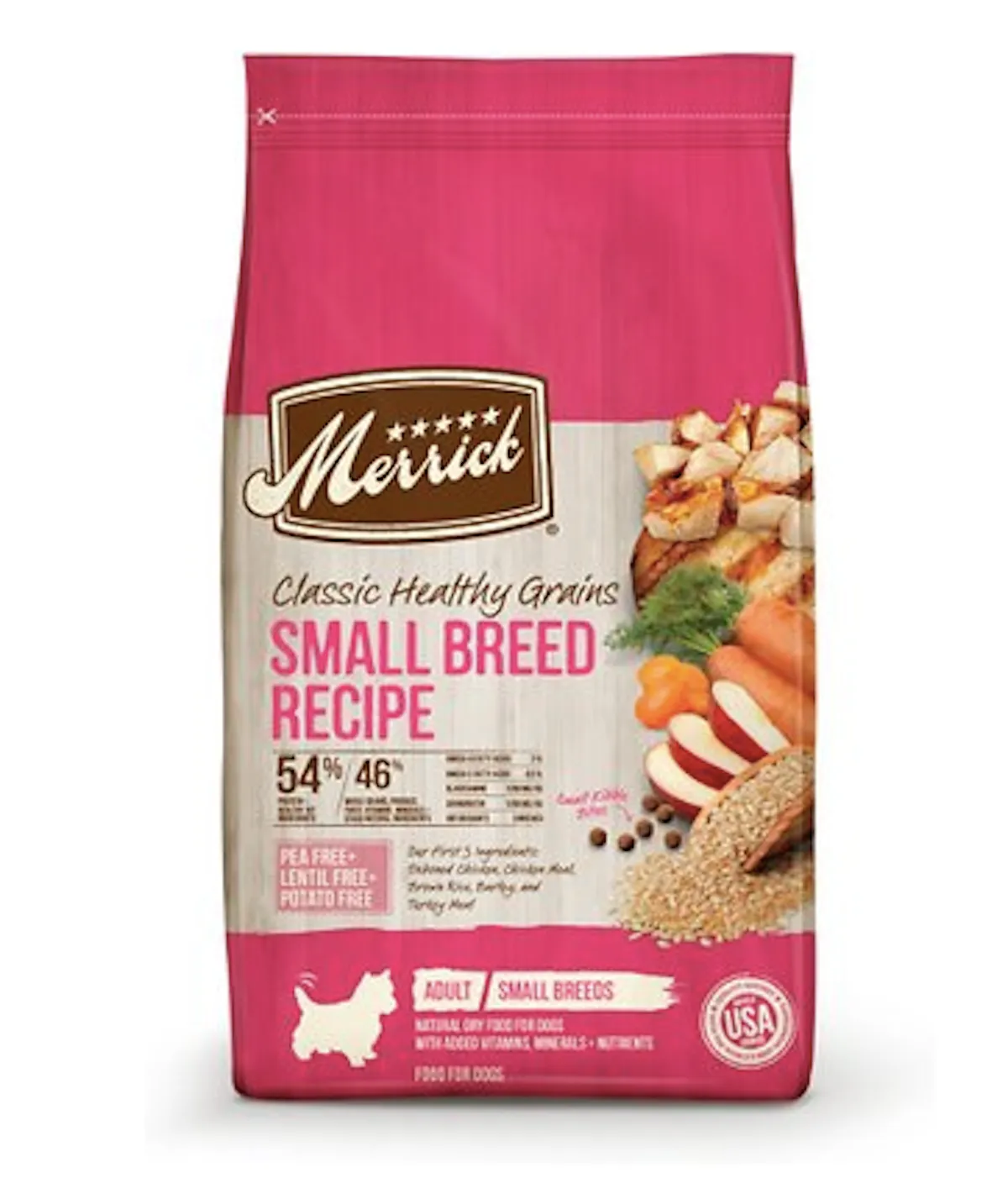 Merrick Lil' Plates Grain-Free Small Breed Puppy chicken and sweet potato recipe
Merrick Lil' Plates Grain-Free Small Breed Puppy chicken and sweet potato recipe
Jiminy’s Good Grub: Sustainable and Nutrient-Dense for Young Dogs
Jiminy’s offers a truly innovative and sustainable approach to puppy nutrition with its Good Grub Dog Food, which utilizes insect-based protein—specifically crickets. This humane and eco-friendly option provides a nutrient-dense alternative to traditional meat-based foods. The formula combines insect protein powder with wholesome plant-based ingredients like oats, sweet potato, and flaxseed, creating a balanced meal that helps small breed puppies maintain a healthy weight and provides sustained energy. This unique protein source can also be beneficial for puppies with common protein allergies.
Unlike many extruded dog foods that are processed under high heat and pressure, Jiminy’s employs a small-batch baking process. This method helps preserve the vital nutrients, ensuring your growing puppy receives a more wholesome and bioavailable meal. The kibbles themselves are intentionally small, making them easily chewable and digestible for petite puppies and their sensitive stomachs. Jiminy’s commitment to sustainability and superior nutrition makes their Good Grub an excellent choice for puppy parents looking for an environmentally conscious yet highly beneficial diet.
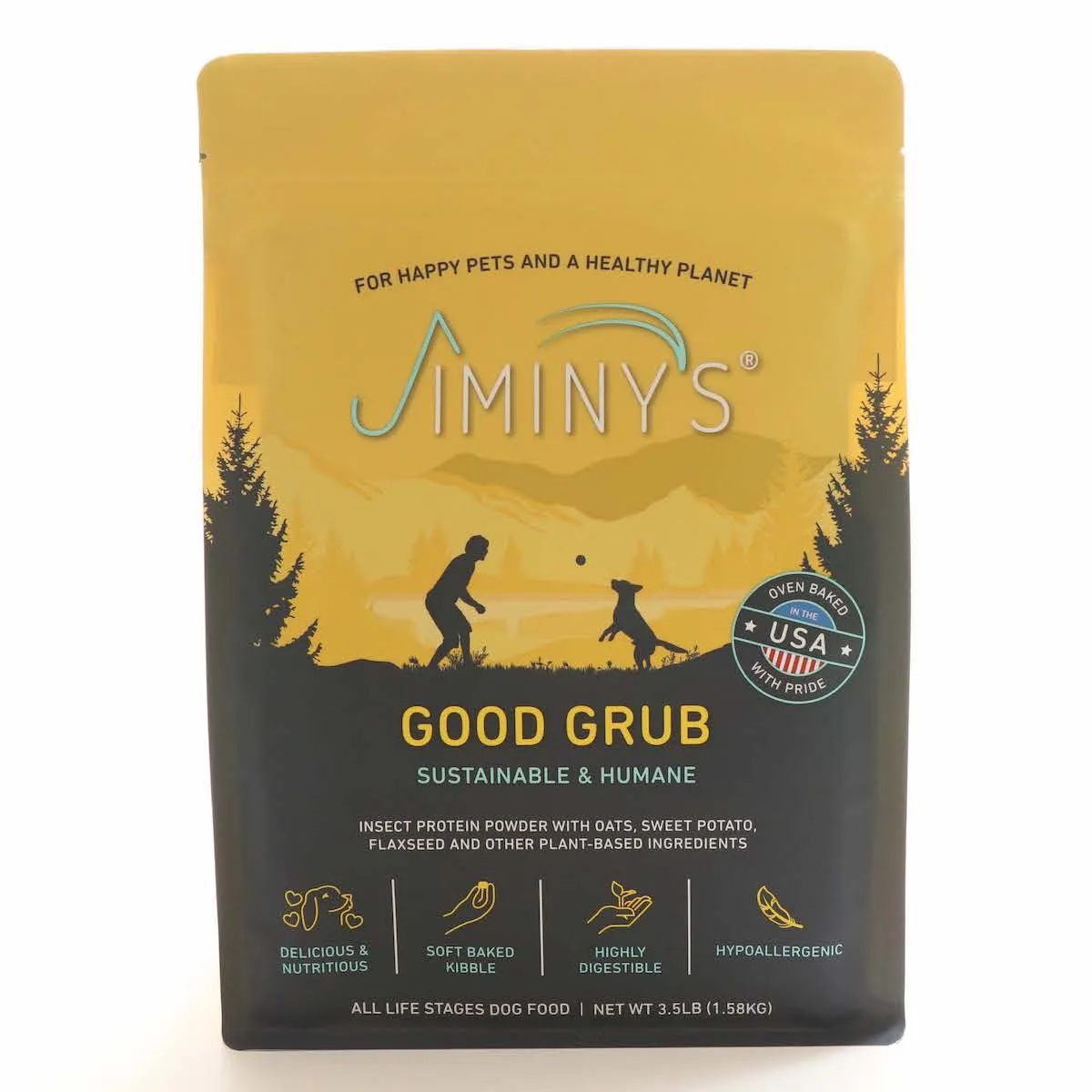 Jiminy's Good Grub insect-based dry dog food for small breed puppies
Jiminy's Good Grub insect-based dry dog food for small breed puppies
Instinct Raw Boost Grain-Free Small Breed Puppy: Raw Nutrition in a Convenient Form
Instinct Raw Boost Grain-Free Recipe With Real Chicken for Small Breed Dogs (suitable for all life stages, including puppies) provides the robust health benefits of a raw diet in a convenient and shelf-stable freeze-dried form. This high-protein formula features cage-free chicken as its primary ingredient, delivering essential amino acids to support lean muscle development in your active small breed puppy. The blend is meticulously balanced with protein, fat, and calories to help tiny dogs achieve and maintain a healthy body weight, crucial for preventing growth issues.
This recipe is formulated without common allergens and undesirable ingredients like grain, potato, corn, wheat, soy, artificial colors, by-product meal, or preservatives, making it a clean and healthy choice for your growing pup. Furthermore, it’s enriched with high levels of calcium and phosphorus for strong bones and teeth, alongside glucosamine and chondroitin, which are vital for supporting healthy hip and joint development in small breeds. By offering a blend of high-quality kibble and freeze-dried raw pieces, Instinct Raw Boost provides a power-packed meal that caters to your small breed puppy’s overall well-being. Keeping them active is also key to joint health, so consider adding [the best dog toys for aggressive chewers](https://dogcarestory.com/the-best-dog-toys-for-aggressive-chewers/) to their routine for mental and physical stimulation.
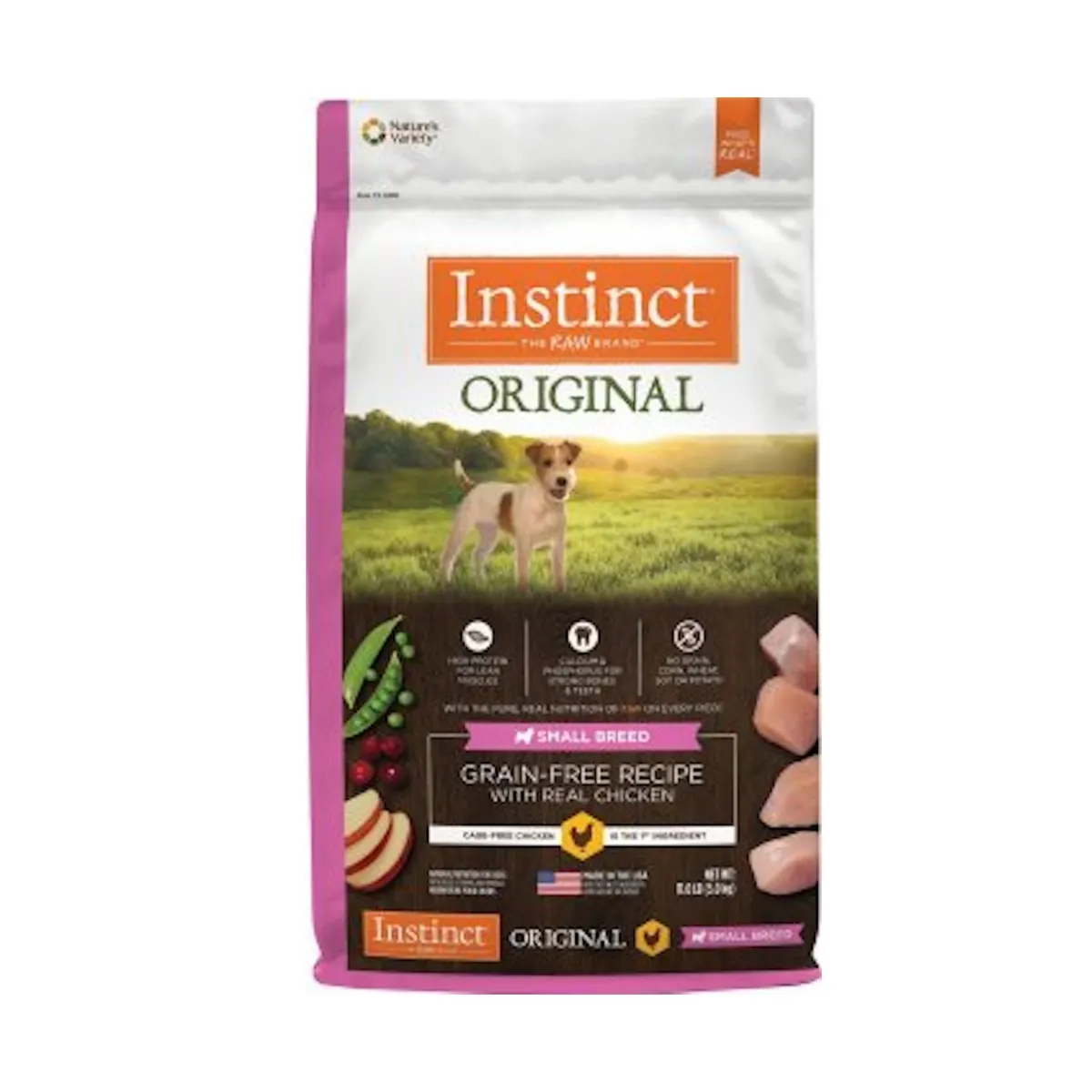 Instinct Raw Boost Grain-Free Small Breed Puppy kibble with freeze-dried raw bits
Instinct Raw Boost Grain-Free Small Breed Puppy kibble with freeze-dried raw bits
Conclusion
Choosing the best puppy food for your small breed in 2021 is a foundational step in ensuring a long, healthy, and happy life. These tiny companions have specific needs that premium, well-formulated foods are designed to address, from supporting their rapid growth and high energy levels to promoting healthy digestion and robust immune systems. Prioritizing ingredients that are high-quality, easily digestible, and rich in essential nutrients like DHA, omega fatty acids, and balanced minerals will make a significant difference in their overall well-being during these crucial developmental stages.
Always remember that every puppy is unique, and what works best for one might not be ideal for another. We strongly recommend consulting with your veterinarian to discuss your small breed puppy’s individual dietary needs, health conditions, and any specific concerns. A vet can provide personalized advice and help you select the perfect food to nourish your beloved tiny companion as they grow into a healthy, thriving adult. Provide them with the best start, and they’ll reward you with a lifetime of unconditional love and companionship.
